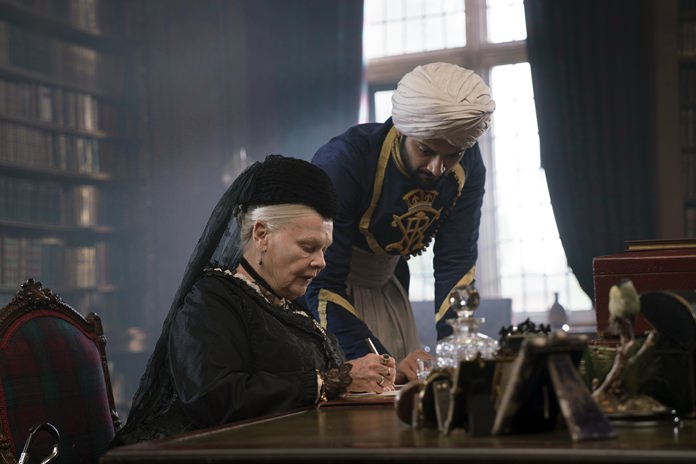
Los Angeles (AP) – Stop us if this sounds familiar: A tall, dark, bearded servant of rough breeding comes from far away to suddenly charm a grumpy, widowed Queen Victoria and thus upend Britain’s royal court at the turn of the 20th century.
 You were perhaps thinking of the film “Mrs. Brown,” starring Judi Dench as the monarch and Bill Connolly as her Scottish underling, John Brown? Well, hold on. A new movie has come along exactly 20 years later with an eerily similar plot. Either Victoria was a creature of habit in her attachments or her filmmakers are.
You were perhaps thinking of the film “Mrs. Brown,” starring Judi Dench as the monarch and Bill Connolly as her Scottish underling, John Brown? Well, hold on. A new movie has come along exactly 20 years later with an eerily similar plot. Either Victoria was a creature of habit in her attachments or her filmmakers are.
Substitute Connolly with Ali Fazal and you get “Victoria & Abdul,” a film about the then-most powerful woman on earth’s second unusually intimate relationship with a commoner. In this case, a Muslim from India in 1887.
Fascinatingly, Dench is back as the monarch, two decades after she played Victoria and earned an Oscar nomination for it. It’s a privilege to watch her revisit the crusty, we-are-not-amused queen, who is now in the twilight of her life. Dench is riveting, unsentimental, impatient and gloriously brittle. Sometimes all she does is offer an irritated sigh, speaking volumes. “Everyone I loved has died and I just go on and on,” she cries.
Dench is well supported — the cast includes the marvelous Eddie Izzard, the late Tim Pigott-Smith and the imperious Michael Gambon — and the pomp and highly choreographed English ceremonialism is captured beautifully by director Stephen Frears, who knows a thing or two about royalty, having directed Helen Mirren in “The Queen.” Much of this film is composed of stuffy royal banquets with hundreds of servants scurrying about or soaring landscapes with hundreds of servants scurrying around.
There’s only one major problem: The man at the center, Abdul Karim. He remains a blank canvas, his motives unexplored, his interior or domestic life uncaptured. He is called “the brown John Brown” and offers no riposte. The title of the film promises us two people but we only get one.
Perhaps screenwriter Lee Hall (“War Horse,” 3Billy Elliot”) meant to leave him a cypher, allowing the English to try to define him, but that’s being generous. It’s hard to leave this film and not think that Spike Lee’s concept of “magical Negroes” needs to be expanded for other people of color.
The movie is based on journalist Shrabani Basu’s book “Victoria & Abdul: The True Story of the Queen’s Closest Confidant,” which told of Victoria’s close friendship with an Indian servant sent to the court with the sole task of offering a gift of a ceremonial coin. The filmmakers have taken factual liberties — the film is “based on real events… mostly,” which is very cute but meaningless.
Fazal’s Karim smiles a lot, seems absolutely enchanted by English weather and, at their second meeting, without provocation, prostrates himself to kiss Victoria’s feet. Why? He thought it would “cheer her up.”
What does Karim think of colonialism, of English state-sponsored brutality toward his people? We never know. “It is my humble privilege to serve Her Majesty,” he says. Later, he puts on his best Forrest Gump to tell the queen that “Life is like a carpet.” He means that all kinds of things are woven into our fabric but he really comes off as no more than a doormat. (At least Connolly got to show some grit as the queen’s previously adored servant — “Are you deaf as well as stupid?” he told the Prince of Wales in one scene.)
Mid-way through the film, Karim has moved permanently to England and become the queen’s spiritual adviser, startling the court with his outsized influence. She will have none of it, siding always with her strong, silent, Indian beefcake. That also sounds familiar: Check out “The Green Mile” or “The Legend of Bagger Vance,” which also feature non-white characters with mystical powers employed entirely for the benefit of white leads.
The filmmakers knew in 2017 they couldn’t ignore the horrors of empire so it’s left to actor Adeel Akhtar, who plays Karim’s more radicalized companion, to carry the flag of nationalism and anti-colonialism. It’s a pity we never know what his friend, who has the queen under his influence, thinks.
British films seem to be looking backward these days on their legacy in India. “Victoria & Abdul” comes out only a few months after “Viceroy’s House,” which explored how India and Pakistan were carved from the former British Empire in 1947. In that case, England’s Lord Mountbatten came off as honest, loving and decent. In “Victoria & Abdul,” the Empress of India comes off honest, loving and decent. In neither film do Indians tell their story or any story without a gauzy English filter. That seems deaf as well as stupid.
“Victoria & Abdul,” a Focus Features release, is rated PG-13 by the Motion Picture Association of America for “some thematic elements and language” Running time: 111 minutes. Two stars out of four.





